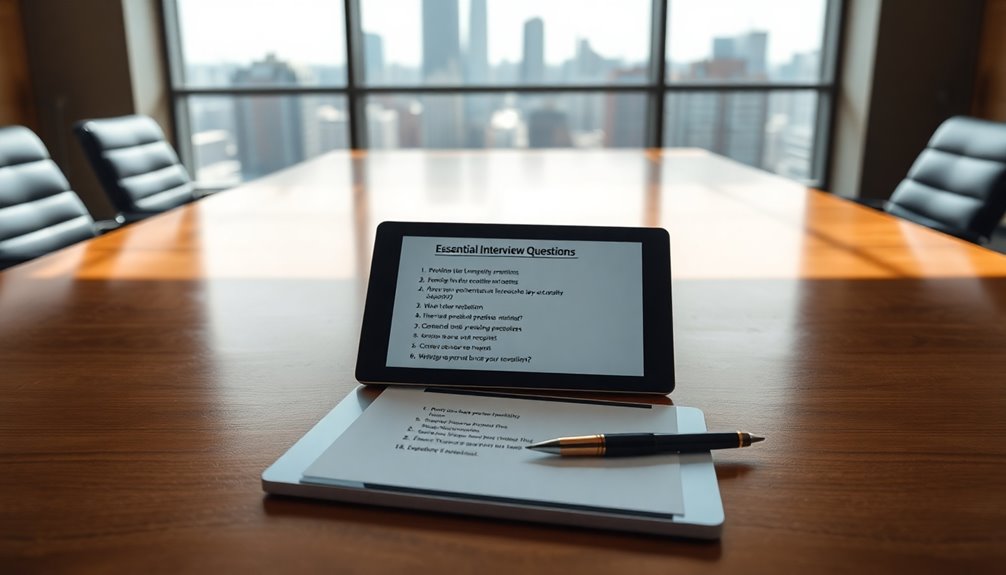When interviewing property managers, focus on their experience and qualifications first. Ask about their training, certifications, and understanding of local housing laws. Next, inquire about their key responsibilities, like managing tenant relations and overseeing property maintenance. Vital skills like communication, organization, and conflict resolution are essential, so explore their familiarity with property management software too. Be sure to gauge their knowledge of the eviction process and financial management strategies that maximize profitability. Ultimately, these questions will help you find a qualified candidate. There's much more to uncover about effective interviewing techniques for property managers.
Key Takeaways
- Inquire about the candidate's experience in property management, including specific roles and years of service.
- Ask about their familiarity with local building codes and state fair housing laws.
- Evaluate their approach to tenant relations and conflict resolution techniques.
- Discuss their financial management skills, particularly in budgeting and rent collection.
- Explore their knowledge of the eviction process and relevant state-specific laws.
Experience and Qualifications

When interviewing a property manager, it's vital to assess their experience and qualifications to guarantee they can effectively handle the demands of the role.
Start by asking about their years in property management and the various roles they've held. This helps you gauge their depth of experience.
Inquire about their training and education background, especially any certifications relevant to property management. It's important they understand local building codes and state fair housing laws, as these laws directly impact their daily responsibilities.
Evaluating their familiarity with these regulations guarantees they can navigate legal complexities.
Key Responsibilities and Duties

Key responsibilities and duties of a property manager encompass a wide range of tasks essential for maintaining the functionality and profitability of rental properties. You'll manage tenant relations, ensuring their concerns are addressed promptly. Oversight of property maintenance and repairs is vital, as is handling financial management, which includes rent collection and budgeting. You'll also coordinate leasing processes, from tenant screenings to marketing strategies. Here's a quick overview of these responsibilities:
| Responsibility | Description | Frequency |
|---|---|---|
| Tenant Relations | Address tenant concerns and inquiries | Daily |
| Property Maintenance | Oversee repairs and upkeep | Ongoing |
| Financial Management | Manage budgets and collect rents | Monthly |
| Leasing Coordination | Screen tenants and market properties | As needed |
Essential Skills for Success

To effectively manage properties and guarantee smooth operations, a property manager must possess a variety of skills that enhance their ability to perform their responsibilities.
Strong communication and negotiation skills are essential; they help you build rapport with tenants, resolve conflicts, and manage vendor relationships.
Organizational and multitasking abilities are important for juggling multiple properties and ensuring all tasks are completed on time.
Proficiency in conflict resolution and problem-solving enables you to handle disputes effectively, while familiarity with property management software streamlines your operations.
Additionally, having a solid understanding of financial management, including budgeting and rent collection, is critical for maintaining profitability and ensuring the property runs efficiently.
Each of these skills contributes greatly to your success as a property manager.
Eviction Process Understanding

Understanding the eviction process is essential for any property manager, as it involves maneuvering through legal requirements and guaranteeing tenant rights are upheld.
You need to familiarize yourself with your state's specific eviction laws, including the proper steps for issuing notices and filing court documents. Typically, evictions arise from non-payment of rent, lease violations, or property damage.
You'll want to document all interactions with tenants and maintain detailed records, which can prove invaluable during disputes. Knowing the timeline for each step, from notice to court appearance, helps streamline the process.
Additionally, being aware of potential defenses tenants might raise can prepare you for legal challenges and guarantee you handle evictions professionally and fairly.
Profitability and Financial Management

Maximizing profitability in property management requires a keen focus on financial management and strategic decision-making.
You'll need to analyze market trends to set competitive rental prices that attract tenants while guaranteeing profitability. Implementing cost management strategies is essential; keep a close eye on maintenance and repair expenses to avoid unnecessary costs.
Additionally, maximizing occupancy rates boosts revenue, so consider proactive leasing strategies that fill vacancies quickly. Regularly monitoring financial performance metrics, like cash flow and return on investment, helps you make informed decisions. Understanding production quantity variance can also assist in optimizing resource allocation and minimizing costs.
It's vital to stay organized and develop a solid budgeting process to manage revenues effectively. By prioritizing these areas, you can enhance your properties' profitability and secure long-term financial success.
Tenant Relations and Management

Building strong tenant relations is essential for successful property management, as positive interactions can lead to long-term occupancy and tenant satisfaction. You should prioritize open communication, addressing tenant concerns promptly and professionally.
Establishing clear expectations from the outset helps prevent misunderstandings and fosters trust. Regular check-ins can also enhance relationships, allowing tenants to feel valued and heard.
When handling disputes or issues, approach them with empathy and a focus on resolution. Having a structured process for addressing complaints can streamline this effort.
Additionally, implementing tenant retention strategies, such as offering lease renewals or incentives, can solidify your relationship with tenants. Ultimately, a proactive approach to tenant management not only improves satisfaction but also contributes to the overall success of your property.
Crisis Communication Strategies

Strong tenant relations lay the groundwork for effective crisis communication strategies.
When emergencies arise, you'll need a solid plan to keep tenants informed and safe. By establishing clear lines of communication, you can minimize confusion and foster trust.
Here are a few key strategies to evaluate:
- Timely Updates: Provide regular updates via emails, texts, or community boards to keep everyone informed of the situation.
- Emergency Preparedness Plans: Develop and share detailed plans for different scenarios, ensuring tenants know what steps to take.
- Utilize Technology: Use apps or websites for instant notifications, making sure your tenants receive information quickly and efficiently.
Implementing these strategies can enhance your response during crises, ultimately leading to better tenant satisfaction and safety.
Interview Preparation Techniques

As you prepare for your property manager interview, it's essential to focus on several key techniques that can enhance your chances of success.
Start by researching the company, understanding its values, and familiarizing yourself with its properties.
Next, practice answering common interview questions, highlighting your experience and skills.
Dress professionally to make a strong first impression and demonstrate your seriousness about the role.
Prepare thoughtful questions to ask the hiring manager, showing your interest in the position and the company.
Finally, consider conducting mock interviews with a friend or mentor to build confidence.
Following up after the interview with a thank-you note can also leave a positive impression, reinforcing your enthusiasm for the opportunity.
Frequently Asked Questions
How Do You Stay Updated on Property Management Laws and Regulations?
To stay updated on property management laws and regulations, you can regularly read industry publications and follow relevant online forums.
Attending workshops and seminars helps you gain insights from experts.
Joining professional organizations offers access to resources and networking opportunities.
You should also subscribe to newsletters from local government offices.
What Software Do You Use for Property Management Tasks?
When it comes to property management tasks, you'll likely use specialized software to streamline operations.
Depending on your needs, you might choose platforms like AppFolio, Buildium, or Yardi. These tools help you manage tenant communications, track maintenance requests, and handle financial transactions efficiently.
Make sure to familiarize yourself with the software's features, as mastering it can greatly enhance your productivity and improve your overall management process.
Can You Describe Your Approach to Maintaining Vendor Relationships?
Imagine you're managing a property and the HVAC system fails in winter. You'd reach out to your trusted HVAC vendor immediately.
You maintain vendor relationships by regularly communicating project updates, providing feedback, and hosting occasional meetings to discuss needs. This builds trust and guarantees they're ready when emergencies arise.
How Do You Measure Tenant Satisfaction and Retention?
To measure tenant satisfaction and retention, you can conduct regular surveys and feedback sessions.
Listen to their concerns and address issues promptly. Track lease renewals and analyze retention rates over time.
You should also encourage open communication, making tenants feel valued. Implementing a tenant appreciation program can enhance their experience.
Finally, monitor online reviews to gauge their satisfaction levels and make necessary adjustments to improve the overall living environment.
What Challenges Have You Faced in Managing Multiple Properties Simultaneously?
Managing multiple properties simultaneously can be challenging. You might struggle with time management, balancing tenant needs, and maintaining property upkeep.
You'll likely face issues like coordinating repairs across different locations and handling tenant communications efficiently. Prioritizing tasks and using property management software can help streamline your efforts.
Additionally, developing a strong support network, including reliable contractors, can ease the burden and improve your overall effectiveness in managing diverse properties.
Conclusion
In summary, preparing for your property management interview is vital for showcasing your skills and expertise. Did you know that 72% of property managers say effective tenant relations directly impact their property's profitability? By understanding essential interview questions and honing your responses, you'll position yourself as a standout candidate. Remember, demonstrating your knowledge in areas like financial management and crisis communication can set you apart in this competitive field. Good luck!









